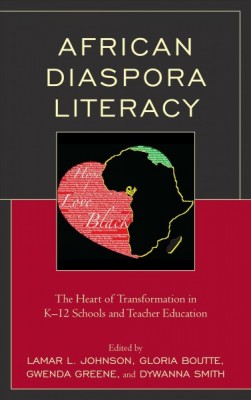| African Diaspora Literacy: The Heart of Transformation in K-12 Schools and Teacher Education Contributor(s): Johnson, Lamar L. (Editor), Boutte, Gloria Ph. D. (Editor), Greene, Gwenda (Editor) |
|
 |
ISBN: 1498583954 ISBN-13: 9781498583954 Publisher: Lexington Books OUR PRICE: $103.95 Product Type: Hardcover - Other Formats Published: November 2018 |
| Additional Information |
| BISAC Categories: - Education | Multicultural Education - Education | Curricula - Education | Teaching Methods & Materials - General |
| Dewey: 373.182 |
| LCCN: 2018046768 |
| Physical Information: 0.9" H x 6.2" W x 9.1" (1.00 lbs) 208 pages |
| Themes: - Ethnic Orientation - Multicultural |
| Descriptions, Reviews, Etc. |
| Publisher Description: This book demonstrates the application of African Diaspora Literacy in K-12 schools and teacher education programs. The book emerged from a four-week Fulbright-Hays Group Abroad project to Cameroon, West Africa, which was focused on African Diaspora Literacy. The project was guided by the African principle of "Ubuntu" (I am because we are). The 15-member team was comprised of eight faculty members (representing five universities-Benedict College, Michigan State University, South Carolina State University, South University, and the University of South Carolina), one community member, two K-12 administrators, and four K-12 teachers from high need schools. The inclusion of such a diverse group of participants in the Kamtok project (e.g., professors, K-12 teachers, community members) lent itself to producing rich data that captured both the intellectual scholarship and layperson's experience with equilateral consideration. The purpose of the project was to gain firsthand knowledge, artifacts, documents, experiences, and resources to be used in the development, implementation, and dissemination of curricula to be used in K-12 schools and university classrooms to more effectively prepare educators to teach African American students. Focusing specifically on the language, history, politics, economics, religion, and cultural traditions of people in the African Diaspora (e.g, U.S., Africa, Caribbean, the Americas, Europe, Asia), this book illuminates critical information typically missing from K-12 schools and teacher education, and English curricula. Chapters are written by scholars from Cameroons as well as those from the U.S. The book represents a lovely compilation of application, theory, and research. The book explores how African Diaspora Literacy can be used to heal the endemic physical, symbolic, linguistic, curricula, pedagogical, and system violence that African American children and youth experience in schools and in society. |